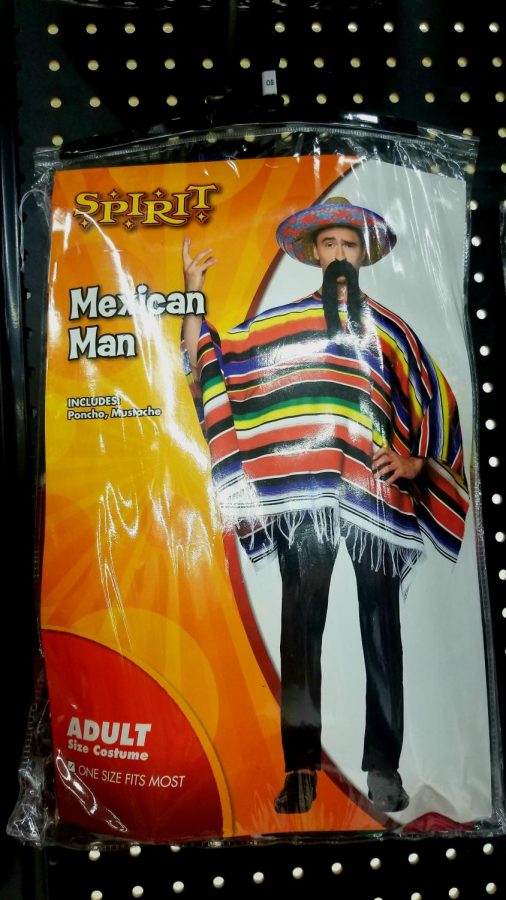Costume correctness
Why Halloween costumes are being called controversial
On the packaging of a Halloween costume at Spirit Halloween in Monaca, a “Mexican Man” is depicted. The costume features a poncho and mustache, representing Mexican culture according to certain popular stereotypes.
In a world sensitive to anything that stands out from the ordinary, it can be hard for some to correctly identify the good from the bad. When it comes to the Halloween tradition of dressing up as someone or something for a day, more and more people every year are specifically classifying certain cultural get-ups as rude or offensive. However, there is a clear line between what is actually offensive and what some intend to be distasteful or not.
One of society’s biggest issues for many years has been racism and discrimination of all kinds. Consequently, it is not much of a surprise that these issues have found their way into an event meant to let both children and adults express their creativity and joy with a choice of wardrobe.
Take the Disney princess Pocahontas for example. When her movie first came out, she was a well-liked and respected movie character that was a Native American. Children especially looked up to her and were inspired to dress up like her for Halloween until someone took the Indian costume the wrong way. It is not intended to be offensive to Native Americans, but if they see it as an attack against their culture there is nothing that can be done. Las Vegas local Briyana Snipes expressed her opinion on the matter last Halloween in 2018, saying, “If it offends someone’s culture, you just shouldn’t do it.” The opposite argument was also made, about how a childhood character such as Pocahontas is not insulting.
Most children do not look this deep when it comes to selecting a costume, but some adults do, and oftentimes cross the line. For instance, if a child wants to dress up as someone of Hispanic ethnicity, they would likely buy a poncho and a sombrero. These cultural clothing items are actually worn in other countries, and it is known from various interviews across the world that people enjoy when others want to dress like their culture.
Where the issue presents itself is when an adult takes the same costume idea and falsifies its cultural accuracy for the sake of making a joke or winning a costume award. Adults have a better understanding of what is wrong and what hurts people, so it is even more offensive for them to purposely cross the line on public platforms, such as Facebook and Instagram.
While some adolescents choose what they wear for Halloween based solely on what intrigues them, even if it is seen as offensive, they are not responsible for the offense. Adults largely contribute to the morals and beliefs of children because kids naturally listen to what they are taught to believe, especially when they are at the young age of most trick-or-treaters.
“As a parent, I feel that costumes cross the line when they are inappropriate for children and have nudity or vulgarity,” Angela, sales associate at Spirit Halloween in Monaca said.
People focus on the fact that someone chose to wear an offensive costume, but the real issue at hand is the fact that such costumes are promoted and available to purchase in the first place. When offensive costume options are openly advertised and normalized, it makes them seem less disrespectful to those that wear them, and even more offensive to those who resemble the costumes.
Cultural stereotyping is seen everywhere nowadays, even in many American traditions and holidays. The purpose of the tradition, known as Halloween, is to let one express themselves through their interests and all the things they have connected with throughout their lives in the form of a costume. Doing this is a great thing, until societal and cultural opinions get in the way of what is so pure, joyful and creative about Halloween festivities.
What people wear for Halloween is nothing more than a choice, but what matters is whether or not people make the correct one.



